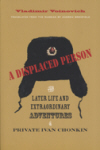A Displaced Person
A Displaced Person: The Later Life and Extraordinary Adventures of Private Ivan Chonkin is the much anticipated finish of the Chonkin trilogy, told through a curious and unexpected Absurdist literary frame for our Russian protagonist. The story of A Displaced Person is fantastical dark satire of a Stalin-era Soviet soldier who manages to blunder his way from one adventure to another. This story, however, is also a wonderfully powerful philosophic commentary on the struggle for meaning in the confusing, conflicted experiences of a Russian Everyman. This detached existentialism that surrounds Private Chonkin throughout the narrative allows the author the opportunity for caustic commentary on Russian and Soviet moralism.
A Displaced Person: The Later Life and Extraordinary Adventures of Private Ivan Chonkin is the much anticipated finish of the Chonkin trilogy, told through a curious and unexpected Absurdist literary frame for our Russian protagonist. The story of A Displaced Person is fantastical dark satire of a Stalin-era Soviet soldier who manages to blunder his way from one adventure to another. This story, however, is also a wonderfully powerful philosophic commentary on the struggle for meaning in the confusing, conflicted experiences of a Russian Everyman. This detached existentialism that surrounds Private Chonkin throughout the narrative allows the author the opportunity for caustic commentary on Russian and Soviet moralism.
The story picks up where its predecessor, Pretender to the Throne, leaves off. We are re-introduced to Private Chonkin, Nyrua (his wife), and other American and Soviet bureaucrats, military officials, peasants, and chance-encountered travelers. Private Chonkin meanders his way through invented lives—Nyrua’s pretended stories from a letter Chonkin never sent her, and Chonkin’s guileless case of mistaken identity where Stalin declares it his mission in life to track down Chonkin. Voinovich leads the reader through Chonkin’s stint in the Soviet Army, his travels to the almost mystically described farmlands of Ohio, his second marriage to an American, Nyrua’s travels from a Siberian village to visit Chonkin in Ohio for dental work, and Chonkin’s anti-climactic return to the Soviet Union as an invited guest to talk about American farming. The reader can scarcely keep track of the byzantine plot twists through the novel.
Through everything, Chonkin meets each encounter with stock simplicity, unable to even rouse himself to a stoic acceptance of his fate. For Chonkin, life is not accepted—it is simply encountered or experienced. In fact, Chonkin’s almost idiot-like simplicity reminds the reader of the protagonist of another Russian novel: in Jaroslav Hasek’s classic The Good Soldier, Svejk, the title character is a bewildering juxtaposition of feigned idiocy or simple out-and-out incompetence—a state that allows him to passively resist his military duties, to the utter irritation of his superiors. Chonkin, not unlike Svejk, is a bumbling anti-hero who leaves the reader simply wondering about the state and the meaning of Chonkin’s inaction.
This bewildering juxtaposition perfectly situates the characters—and the reader—to grapple with the truly Absurdist themes Voinovich introduces in A Displaced Person. One of the clearest themes we see emerging from Chonkin’s adventures is the Absurdist dialectic struggle—the human need to make sense of and find the inherent meaning in life and the human condition, and the stark inability to do so. Voinovich highlights this Absurdist frustration most completely through his supporting characters—the American officer who wants to convince Chonkin of the “correct” politics of 1950s America; the advisors to Stalin within his inner circle, trying to make sense of Stalin’s political convictions and the implementation of his policies; and even in Nyrua’s Siberian villagers trying to identify a coherent narrative for her husband, Chonkin. It’s really only Chonkin, as an existential Absurdist anti-hero, who is detached from this metaphysical struggle and simply encounters life, unbothered by trying to make sense of it. Chonkin’s emotions are superficial, his experiences fantastical, and the meaning behind his life indeterminable. Indeed, even the historical setting for A Displaced Person perfectly aligns with the rise of Absurdism in existentialism.
A Displaced Person: The Later Life and Extraordinary Adventures of Private Ivan Chonkin is a brilliant read. Vladimir Voinovich wraps up his trilogy of Ivan Chonkin—itself, perhaps, an ironic gesture toward triptych or an icon—and readers are treated to one final, enjoyable dose of Voinovich’s caustic dark satire.





